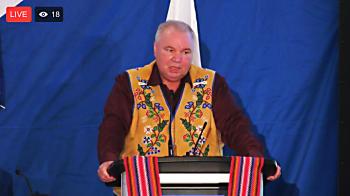Image Caption
Summary
Local Journalism Initiative Reporter
Windspeaker.com
The Supreme Court of Canada ruled in the Daniels decision that Métis come under the jurisdiction of the federal government, and yet in the midst of the coronavirus pandemic, Métis continue to fight for health supports.
“The biggest challenge we face with Canada is with the First Nations and Inuit Health Branch,” said Métis National Council (MNC) Vice-President David Chartrand.
He said FNIHB’s policies have not changed even though the Supreme Court ruled in April 2016 that Canada “was supposed to treat us equally as First Nations.”
The lack of support from the branch comes at the worst time, as COVID-19 targets the elderly as well as people in poor health and with underlying health conditions. Chartrand says a recent long-term study shows that Métis people have the highest levels of diabetes, arthritis and other chronic illnesses.
“We raised this with FNIHB, that they have a fiduciary responsibility to work with us. Just give us a helping hand and we’ll do our own. But their response is that their relationship is with First Nations and Inuit only. The province (of Manitoba) says we’re not their jurisdiction, we’re the federal government’s,” said Chartrand, who is also president of the Manitoba Metis Federation (MMF), one of five provincial Métis governments that form the MNC.
The result, he says, is Métis, once again, fall between the cracks.
In a presentation to the House of Commons Standing Committee on Indigenous and Northern Affairs on May 7, Chartrand pointed out that personal protective equipment distributed to Indigenous people by the federal government did not include Métis.
“In fact, in Manitoba we have been forced to purchase our own directly from China. We have had no choice as neither level of government has provided access to those important pandemic supplies,” Chartrand told the committee.
Métis have also been excluded from the creation of pandemic plans, says Chartrand. He points to the initial outbreak of COVID-19 in northern Saskatchewan where the Clearwater River Dene Nation received support from FNIHB through a pandemic plan, but the nearby Métis village did not.
“One of the Métis leaders was there advocating for services to come to La Loche for the Métis people. That’s the only way they had their voices being heard, because there was no (pandemic) plan by the province or Canada to deal with Métis villages,” said Chartrand.
In mid-May, Indigenous Services Canada announced $2.3 million in support of the ongoing effort to combat COVID-19 in northwestern Saskatchewan. According to a news release posted on the ISC site, the work is to be a “collective effort between First Nation, Métis, municipal, provincial, and federal partners” with funds to be jointly administered.
Chartrand says the MMF has constructed two emergency health facilities in anticipation of the second wave of COVID-19. With 140 beds spread out over two locations, there is no medical staff to provide health care.
“I’m hoping that before the second wave hits, Canada will ignore FNIHB’s position that Métis are not part of Health Canada’s responsibility, can sit down and say, ‘Look we can’t depend on the province ….’ We’re hoping that lessons are learned in La Loche and there’s a health strategy that includes health support, health staff for the next wave,” said Chartrand.
Chartrand urged the House of Commons Standing Committee to work with the Métis to “transform the health care system and have this reflected in new Indigenous health legislation.”
Chartrand said some supports from Canada to the Métis have rolled out smoothly, including the initial investments announced by Prime Minister Justin Trudeau in March. In that instance, $30 million was received by the five Métis governments, with Alberta, Saskatchewan and Manitoba splitting 75 per cent of the funding evenly and British Columbia and Ontario getting the remaining 25 per cent. This funding was used to develop and roll out action plans and provide immediate support such as food, income, supplies and rent supplements.
The Métis governments also shared $40 million from Ottawa to be used for capital loans to existing businesses.
“It is a good bridge support to keep the business doors open because our greatest fear is there’s going to be a lot of bankruptcies and we don’t want that to happen,” said Chartrand.
Chartrand noted that MMF’s strong financial position allowed it to loan money to Saskatchewan regional offices while they waited for federal dollars to come through. That money has already been repaid.
MMF also lent money to the Alberta Métis Federation, which was formed in February when six northeastern Métis communities rescinded their membership in the Métis Nation of Alberta. MNA received the COVID-19 funding from Ottawa and made it accessible to all Métis Nation citizens, which did not include AMF members.
“Our (MMF) cabinet made it very clear we had to help our families no matter where they lived,” said Chartrand.
Indigenous Services Canada did not respond to repeated requests by Windspeaker.com for comment.

